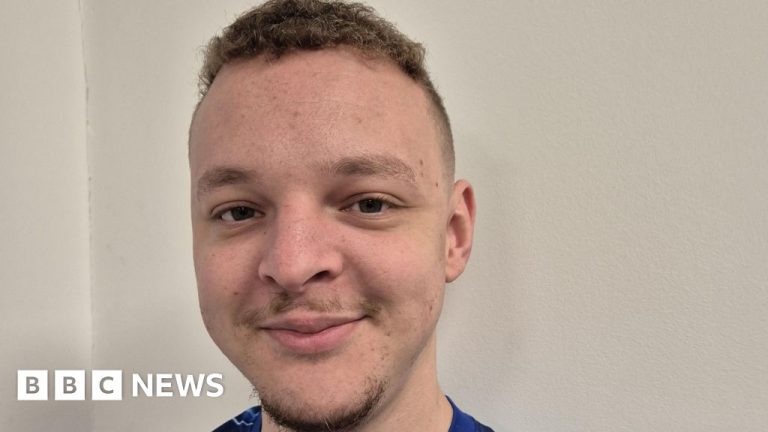Rhys Matthews
Rhys was homeless for two years before finding suitable accommodation with the charity Emmaus.
Vulnerable people in need of care are living in “beyond shameful” housing because the government has so far failed to enforce a new law, MPs and charities say.
The Supported Housing Act was passed in June last year to create standards in the sector, after a select committee found the lack of regulation meant some landlords were “taking advantage” of “supported accommodation”. unacceptable quality.
But no consultation has yet taken place on how this should work and no sector advisory committee has yet been set up. The government blamed the election for the delay and said it was committed to holding consultations and establishing a panel.
Rhys Matthews, 26, told the BBC that supported housing was “the worst place I have ever lived”.
Councils decide whether a person with care needs, such as a mental or physical health problem, is eligible for supported accommodation and who can provide it, but otherwise there is virtually no regulation.
The council pays rent for people who are vulnerable due to factors such as disabilities or experience of homelessness, abuse and addiction.
The new law for the first time gives the Department of Housing and local councils the power to set standards for supported housing providers, but no specific date has been set for the start of a consultation on how the law will work.
A housing sector spokesperson said it had “made a clear commitment… to consult on further measures early next year”.
Furthermore, the advisory committee on supported housing, supposed to be made up of people from the sector who could provide information to the government, has also not been created.
The law required it to be created in June. The government said it was “determined to establish” this group.
“The worst place I have ever lived”
Rhys grew up in foster care and moved into supported accommodation due to health problems.
He told the BBC that the only furniture in his room was a bed and a small wardrobe and that he had piled his belongings on the floor.
He said he was evicted with just an hour's notice after one of the other residents threw a knife at him and spent the next two years living on the streets.
“It was almost like I was the problem, I was the problem and they wanted to get rid of me,” he said. “I had no idea of my rights.”
Rhys now lives in supported accommodation provided by the charity Emmaus, where he is paid to work.
Charities and other not-for-profit groups have always provided supported housing, but private companies have entered the sector over the past decade, with charities and MPs saying many have exploited the lack of regulation to make millions while providing poor quality housing.
Rhys, like the charities we spoke to, wants the new supported housing law to impose minimum standards: larger rooms, safe shared spaces and trained support staff.
He wants owners who do not respect these standards to be criminally convicted in the worst cases. “There has to be some bite,” he said.
“Dangerous and unregulated”
Jasmine Basran, head of policy and campaigns at homelessness charity Crisis, said: “People who have already suffered significant disadvantage are being forced to live without adequate support in unsafe, unsanitary and frankly unlivable conditions. . »
She said it was promising that the government would consult on how to improve supported housing “but we need to see progress in this area – urgently”.
Charlotte Talbott, chief executive of Emmaus UK, said there were “far too many cases where individuals are abandoned by unscrupulous providers, with substandard support and accommodation having devastating consequences for those who depend on their services.
The London Assembly has described the sector as “dangerous and unregulated”.
Meanwhile, a BBC investigation in 2022 found that supported housing schemes in the West Midlands were riddled with crime, drugs and deaths in one case.
Yet despite years of concern, action has been slow, which doesn't surprise Rhys.
“This is so typical of the government,” he said.
“Unfortunately, with supported housing and homelessness, it always seems to take a back seat in any government, Labor or Conservative.”
MP Bob Blackman, who drafted the law, criticized the “snail's pace” in its implementation, adding that action was urgently needed because the sector is a “ticking time bomb”.
The Department of Housing said it was “right that decisions on consultation were suspended during the general election”.
They added that panel members “will be named in due course” after interviews close this month.
'Pressure cooker'
Even if the law were implemented, the National Housing Federation (NHF) said it would not solve “the extreme financial problems caused by severe funding cuts, combined with rampant inflation and rising running costs”.
It estimates that more than a third of supported housing providers closed their programs last year and that 60% of them intend to close sites in the future.
At the same time the supply of supported housing is falling, with many charities saying demand has soared due to NHS budget cuts and rising homelessness.
Sophie Boobis, head of policy and research at Homeless Link, said the consultation was needed so good providers could set a standard for what good looks like and remove the uncertainty created by a lack of regulation.
“It’s a risky sector… It’s like a pressure cooker right now.”

